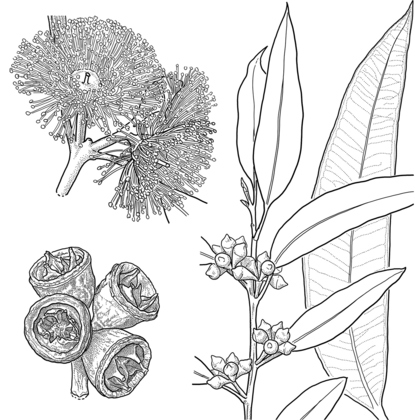Eucalyptus cryptica T.C.Wilson, S.Rutherf. & S.M.Douglas APNI* Synonyms: Eucalyptus sp. Cattai (Gregson s.n. 28 Aug 1954) NSW Herbarium APNI*
Eucalyptus sp. Cattai (NSW 318983) APNI*
Eucalyptus notabilis - resinifera subsp. resinifera APNI*

Description: Small mallee-like tree to 4.5 m high, with more or less crooked trunks and bark thick, sub-fibrous, furrowed, but loose on lower trunk tending to scaly bloodwood type higher up.
Adult leaves disjunct, lanceolate to broad lanceolate, 4.6–11.5 cm long, 1–4.2 cm wide, dark green, glossy, discolorous, penniveined.
Umbellasters 6–8-flowered; peduncle flattened or angular, 5–13 mm long; pedicels terete, 0–6 mm long. Buds fusiform to ovoid or conical, 6–10 mm long, 3.5–5 mm diam., scar present; calyptra conical to hemispherical, sometimes slightly beaked, more or less ribbed, at least as wide as hypanthium, length longer or shorter than hypanthium.
Fruit hemispherical or cup-shaped, 5–6 mm long, 5–7 mm long; disc flat to raised; valves exserted.
Distribution and occurrence: This taxon is endemic to the Kenthurst - Annangrove area in western Sydney. Grows as isolated trees or small groups of trees in scrub, heath and low woodland, in sandstone-derived soils.
NSW subdivisions: CC
Threatened species: NSW BCA: Endangered; Commonwealth EPBC: Critically Endangered
This taxon was regarded as an intergrade between Eucalyptus notabilis and Eucalyptus resinifera subsp. resinifera by K.D. Hill and L.A.S. Johnson.
Text by A.E. Orme
Taxon concept: Eucalyptus cryptica (Myrtaceae): a critically endangered new species T.C. Wilson , S. Rutherford, Jia-Yee; S. Yap, S.M. Douglas, E. Lee and M. Rossetto. Australian Systematic Botany 36(5) 386-400 https://doi.org/10.1071/SB22031 Published: 5 September 2023
APNI* Provides a link to the Australian Plant Name Index (hosted by the Australian National Botanic Gardens) for comprehensive bibliographic data
***The AVH map option provides a detailed interactive Australia wide distribution map drawn from collections held by all major Australian herbaria participating in the Australian Virtual Herbarium project.
|


